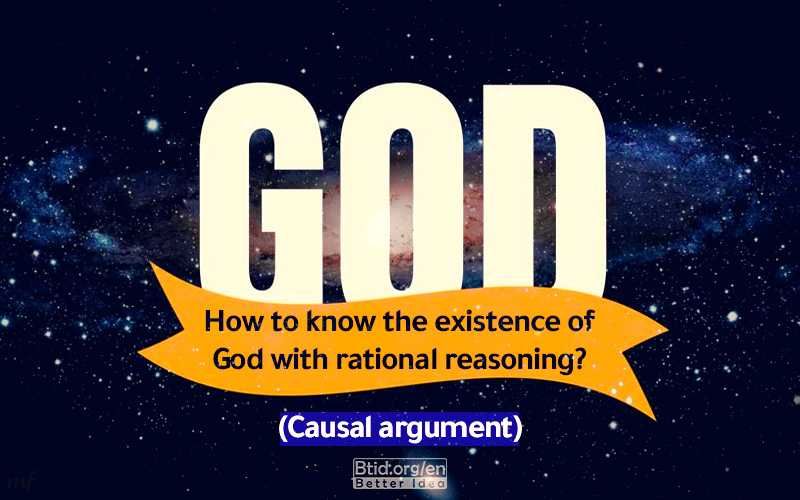After it became clear (with rational reasons) that we have to do research on the religion and we have to try to know God, it is time to discuss one of the most controversial topics, which is to realize how to know God. In other words, how to prove God with rational reasoning? Or even one step back, is there any God for the world? How is it proved? In this article, the author is going to present one rational more complicated answer to this fundamental question in plain English.

How to know the existence of God with rational reasoning? (Causal argument)
Introduction
Beforehand, we discussed the necessity of researching religion and God.[1] We found out that with rational reason, we realize that we have to go to know God and religion. Then, we are supposed to know how to prove God. In fact, there have been several ways and reasons for proving God since many years ago. Some of them are more complicated and philosophic, while the others are easier. Some of them are based on the phenomena and creatures of the world, while others are based on God Himself (the absolute existence). We are going to get familiar with a little more complicated, while extremely precise, rational reason for proving God.
Causal argument
One other rational argument for proving God is the “causal argument” (also called “cosmological argument”). In contrast to the design argument [2], this argument is based on the need for creatures (for a cause). Before we explain this argument, we should mention a topic as a prelude to understanding the argument better:
Assume that we have two things: A and B. If A creates B and causes B, A is the “cause” of B, and B is the “effect” of A. So, the relationship between A and B is causality or causation. For example, when a person builds a building, that person is the cause of the building [3]. Or when the fire burns a paper, the fire is the cause of paper burning.
Now that we have learned this, we obviously understand that all things[4] (everything exists or even is assumed) are divided into these two states [5] :
- It needs a cause (so that the cause brings it to existence)
- It does not need any causes that bring it to existence (because it is self-contained and self-sufficient and does not need others to bring it to existence).
Our intellect understands well that everything is inevitably in one of these two groups. Since everything (for coming to existence) is either in need of cause (thus it is in the first category) or not in need of cause (thus it is in the second category).
This is an obvious rational rule that cannot be avoided. In fact, this principle originated from one of the clearest and the most obvious rational principles [6].
Furthermore, we obviously know that there exist some things and creatures in the world. Then, if there is at least one thing that does not need any causes that bring it to existence, the desirable conclusion will be proved and it will be proved that God (the self-sufficient and self-contained thing) exists. Therefore, in the causal argument, we are going to prove that there is at least one thing in the second category (the category of things that do not need any causes that bring them to existence).

For reasoning, imagine that all things and creatures of the world are in need of cause (thus they are in the first category). But In fact, this assumption would be impossible and therefore, nothing would come into existence. Because all of these creatures and things need a cause that brings them into existence. So, there are two other states (providing that the things of the category [7] are shown with A, B, C, etc.):
1- The cause of A is B. But B also needs a cause. So, the cause of B is C. But C also needs a cause. So, the cause of C is …, and so on ad infinitum (this chain continues forever and goes to infinity). This form is called “infinite regress”. In fact, this type is impossible (on the condition that all things of this chain want to exist actually). Our intellect understands well that if a thing in this chain wants to exist actually, there must be finally another thing (before it) whose existence does not depend on anything else. (This independent thing does not need any causes and is located in the second category.). In other words, this chain logically cannot be infinite, and it has to be finite.
2- The cause of A is B. But B also needs a cause. The cause of B is A. This form is technically called “circularity”, and is impossible, too. Because when B is the cause of A, B has to exist before A and prior to A. In addition, we also assumed that A was the cause of B. Thus, A has to exist before B and to be prior to B. (So, B has to be not prior to A). Therefore, it is concluded that both A and B have to be prior to each other [8], which is logically impossible.
When all things in the first category need a cause that brings them to the existence, and when it is proved that the two other states (“infinite regress” and “circularity”) as mentioned are impossible, it is concluded inevitably that there must be at least one thing in the second category (that does not need any causes that brings it to the existence). This thing in the second category is the very God (that we were supposed to prove His existence with this rational argument).

Causal argument in other words
Additionally, this argument can be summarized as follows. It consists of two premises and a conclusion:
Premise 1: The creatures of the world[9] are “effect”s (= in need of a cause).
Premise 2: Everything which is an “effect”, is in need of a cause.
Conclusion: The creatures of the world are in need of a cause (that is self-sufficient and does not need any causes that bring it to the existence). Because “infinite regress” and “circularity” are logically impossible. The self-sufficient cause is the same God.
The causal argument in the Holy Qur’an
Although this argument entirely has probably not been mentioned outspokenly and clearly in the Holy Qur’an, there are some verses of the Holy Qur’an that allude to it. We mention only one case. The Holy Qur’an expresses:
“Were they created from nothing? Or are they [their own] creators?” [10]
The causal argument in the narrations from the infallible leaders (P.B.U.them)
There are several narrations concerning this argument. For instance, Imam Ali (P.B.U.H.) said:
“And whatever is dependent on something else is an effect.” [11]
This narration states the causal argument or at least, alludes to it.
Conclusion
Ultimately, according to the causal argument, it is proved that there exists at least one thing that dose not need any causes that create it and is self-sufficient. That thing is the same God. [12] However, there need to be some more additional arguments and reasons for proving that this God is the same God with some characteristics (such as being unique, wise, capable, creator, provider, resourceful, etc.). We will mention those additional arguments in the future.
Notes:
[1]. Refer to “The rational necessity of researching the religion”
[2]. Refer to “Design argument”
[3]. This example is not precise and is with negligence. Because in this process, the person is not the real cause (= cause of existence) of creation of the building, but is the incomplete cause of the building. Since the building does not receive its existence from the person.
[4]. Generally speaking (= including animal, people, God, ect.)
[5]. This division is regarding the existence of the things.
[6]. Technically called “principle of excluded middle” which states that for every proposition, either this proposition or its negation is true. In this regard, there is a fundamental rational principle which is “principle of non-contradiction” (or “principle of contradiction”). This principle states that contradictory propositions cannot both be true at the same time and in the same sense. Actually, if we do not accept this principle, we cannot accept anything.
[7]. This category consists of the things that need a cause to bring them to the existence.
[8]. Or we can say it in this way, too: “B (A) has to be prior to A (B) and at the same time, B (A) has to be not prior to A (B).”. And the intellect understands obviously that it is impossible.
[9]. “The creatures of the world” refers to the things in the first category, which means the things that are not self-sufficient. So, “the creatures of the world” does not mean everything (even the things that are not in need of the cause).
[10]. The Holy Qur’an, Chapter Tour, verse 35: أَمْ خُلِقُوا مِنْ غَيْرِ شَيْءٍ أَمْ هُمُ الْخَالِقُونَ
[11]. Nahj al Balaghah, Sermon no. 186, p. 272: وَ کُلُّ قَائِمٍ فِی سِوَاهُ مَعْلُولٌ
[12]. No matter how to call Him or name Him. In this step, it is proved only that this cause is self-sufficient. In the future, we will present some arguments that prove that this God is the same God with unique characteristics.



